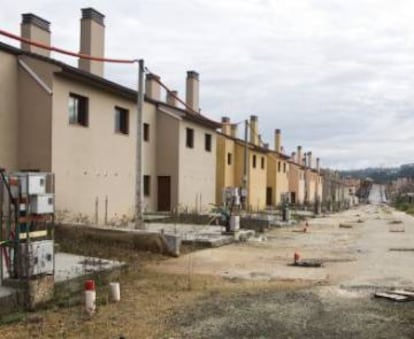Brussels boosts Spain’s growth forecast for 2017 to 2.8%
The EU has revised the country’s economic outlook, situating it above the rest of Europe
Greater growth, less unemployment, a lower deficit. The Spanish economy is starting to pull out of the Great Recession following a lost decade, according to Brussels’ revised forecast for Spain, released on Thursday. According to European Union leaders, the Spanish economy will grow faster than other member states, at a pace of 2.8% in 2017 (half a percentage point more than in the previous forecast) and 2.4% in 2018.

“Spain is no longer the euro’s problem,” said sources consulted on the matter. Not even the deficit, which will close at 3.2% of GDP this year, just one tenth of a point above the target, seems to be an issue anymore. The previous forecast, released in February, had talked about a deficit of 3.5%.
This growth comes on the back of 10 years of hardship during which Spain tackled reforms, digested the real estate crash and raised exports. But deep scars remain in the form of elevated debt levels and job market troubles. At more than 18%, the jobless rate remains clearly above the average for developed nations, and two labor reforms have encouraged competitiveness at the expense of salary levels and job security.
The lion’s share of the adjustments in Spain has been in the exports sector
But Brussels, which sponsored those changes, is not complaining; its assessment of the Spanish Stability Plan sent to the EU executive states that “there are no short-term fiscal risks” anymore.
The assessment provides backing for the Popular Party (PP) government in Madrid at a time of exceptional global uncertainty, the latest example of which was last Sunday’s presidential runoff in France.
For once, the EU executive was a little more optimistic than the Spanish government and the International Monetary Fund (IMF), which are forecasting 2.7% growth and 2.6% in 2017 respectively.
Everything is simpler with growth and inflation; everything is easier outside the corrective arm of the Stability Pact
La Moncloa
Only three months ago, Brussels was thinking that Spain might still have to make significant structural adjustments to the tune of €11 billion. But this scenario seems less likely now. “Everything is simpler with growth and inflation; everything is easier outside the corrective arm of the Stability Pact,” said sources at La Moncloa, the seat of Spain’s government, alluding to a tool used by Brussels to ensure that member states “adopt appropriate policy responses to correct excessive deficits (and/or debts).”

The lion’s share of the adjustments in Spain has been in the exports sector. With some help from the European Central Bank and oil prices, the difference between exports and imports has progressed from a two-digit deficit to a positive balance. On the other hand, the Spanish economy is still dragged down by formidable debt, both private and public. Public debt will still be at around 100% of GDP by 2027.
The other major adjustment was in the job market, which now has two million fewer workers than in 2008 – and those who are in employment are struggling with low salaries and temporary positions. But neither Brussels nor La Moncloa are focusing on that.
English version by Susana Urra.
Tu suscripción se está usando en otro dispositivo
¿Quieres añadir otro usuario a tu suscripción?
Si continúas leyendo en este dispositivo, no se podrá leer en el otro.
FlechaTu suscripción se está usando en otro dispositivo y solo puedes acceder a EL PAÍS desde un dispositivo a la vez.
Si quieres compartir tu cuenta, cambia tu suscripción a la modalidad Premium, así podrás añadir otro usuario. Cada uno accederá con su propia cuenta de email, lo que os permitirá personalizar vuestra experiencia en EL PAÍS.
¿Tienes una suscripción de empresa? Accede aquí para contratar más cuentas.
En el caso de no saber quién está usando tu cuenta, te recomendamos cambiar tu contraseña aquí.
Si decides continuar compartiendo tu cuenta, este mensaje se mostrará en tu dispositivo y en el de la otra persona que está usando tu cuenta de forma indefinida, afectando a tu experiencia de lectura. Puedes consultar aquí los términos y condiciones de la suscripción digital.









































